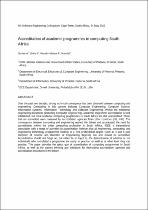JavaScript is disabled for your browser. Some features of this site may not work without it.
- ResearchSpace
- →
- Research Publications/Outputs
- →
- Conference Publications
- →
- View Item
| dc.contributor.author |
Gerber, A

|
|
| dc.contributor.author |
Sinha, S

|
|
| dc.contributor.author |
Van der Merwe, A

|
|
| dc.contributor.author |
Kam, M

|
|
| dc.date.accessioned | 2012-12-04T13:02:20Z | |
| dc.date.available | 2012-12-04T13:02:20Z | |
| dc.date.issued | 2012-05 | |
| dc.identifier.citation | Gerber, A, Sinha, S, Van der Merwe, A, and Kam, M. Accreditation of academic programmes in computing South Africa. 4th Software Engineering Colloquium, Cape Town, South Africa, 24 May 2012 | en_US |
| dc.identifier.isbn | 978-1-4673-1648-4 | |
| dc.identifier.isbn | 978-1-4673-1647-7 | |
| dc.identifier.uri | http://ieeexplore.ieee.org/xpl/articleDetails.jsp?arnumber=6242349 | |
| dc.identifier.uri | http://hdl.handle.net/10204/6395 | |
| dc.description | 4th Software Engineering Colloquium, Cape Town, South Africa, 24 May 2012. This is an ABSTRACT ONLY. The definitive version is published in IEEE Xplore. Doi: 10.1109/SE.2012.6242349 | en_US |
| dc.description.abstract | Over the past two decades, strong technical convergence has been observed between computing and engineering. Computing in this context includes Computer Engineering, Computer Science, Information Systems, Information Technology and Software Engineering. Within the traditional engineering disciplines (including Computer Engineering), academic programme accreditation is well established, but most academic computing programmes in South Africa are still unaccredited. Those that are accredited were reviewed by accreditation agencies from other countries (US, UK). The convergence between computing and engineering opened the debate and accentuated the need for accreditation within the wider computing profession in South Africa. IEEE, a transnational association with a range of activities in accreditation, believes that all engineering, computing, and engineering technology programmes leading to a first professional degree (such as 4 and 5-year Bachelor of Science and Bachelor of Engineering degrees) can and should be accredited. Accreditation should not hinge on, but rather be an input to, the determination of whether or not individuals who completed a programme are ready to practise, as well as at what level they can practise. This paper provides the status quo of accreditation of computing programmes in South Africa, as well as the current thinking and initiatives for developing accreditation agencies and accreditation procedures in the future. | en_US |
| dc.language.iso | en | en_US |
| dc.publisher | IEEE | en_US |
| dc.relation.ispartofseries | Workflow;9900 | |
| dc.subject | Academic programme accreditation | en_US |
| dc.subject | Computer programmes | en_US |
| dc.subject | South African academic accreditation | en_US |
| dc.title | Accreditation of academic programmes in computing South Africa | en_US |
| dc.type | Conference Presentation | en_US |
| dc.identifier.apacitation | Gerber, A., Sinha, S., Van der Merwe, A., & Kam, M. (2012). Accreditation of academic programmes in computing South Africa. IEEE. http://hdl.handle.net/10204/6395 | en_ZA |
| dc.identifier.chicagocitation | Gerber, A, S Sinha, A Van der Merwe, and M Kam. "Accreditation of academic programmes in computing South Africa." (2012): http://hdl.handle.net/10204/6395 | en_ZA |
| dc.identifier.vancouvercitation | Gerber A, Sinha S, Van der Merwe A, Kam M, Accreditation of academic programmes in computing South Africa; IEEE; 2012. http://hdl.handle.net/10204/6395 . | en_ZA |
| dc.identifier.ris | TY - Conference Presentation AU - Gerber, A AU - Sinha, S AU - Van der Merwe, A AU - Kam, M AB - Over the past two decades, strong technical convergence has been observed between computing and engineering. Computing in this context includes Computer Engineering, Computer Science, Information Systems, Information Technology and Software Engineering. Within the traditional engineering disciplines (including Computer Engineering), academic programme accreditation is well established, but most academic computing programmes in South Africa are still unaccredited. Those that are accredited were reviewed by accreditation agencies from other countries (US, UK). The convergence between computing and engineering opened the debate and accentuated the need for accreditation within the wider computing profession in South Africa. IEEE, a transnational association with a range of activities in accreditation, believes that all engineering, computing, and engineering technology programmes leading to a first professional degree (such as 4 and 5-year Bachelor of Science and Bachelor of Engineering degrees) can and should be accredited. Accreditation should not hinge on, but rather be an input to, the determination of whether or not individuals who completed a programme are ready to practise, as well as at what level they can practise. This paper provides the status quo of accreditation of computing programmes in South Africa, as well as the current thinking and initiatives for developing accreditation agencies and accreditation procedures in the future. DA - 2012-05 DB - ResearchSpace DP - CSIR KW - Academic programme accreditation KW - Computer programmes KW - South African academic accreditation LK - https://researchspace.csir.co.za PY - 2012 SM - 978-1-4673-1648-4 SM - 978-1-4673-1647-7 T1 - Accreditation of academic programmes in computing South Africa TI - Accreditation of academic programmes in computing South Africa UR - http://hdl.handle.net/10204/6395 ER - | en_ZA |






